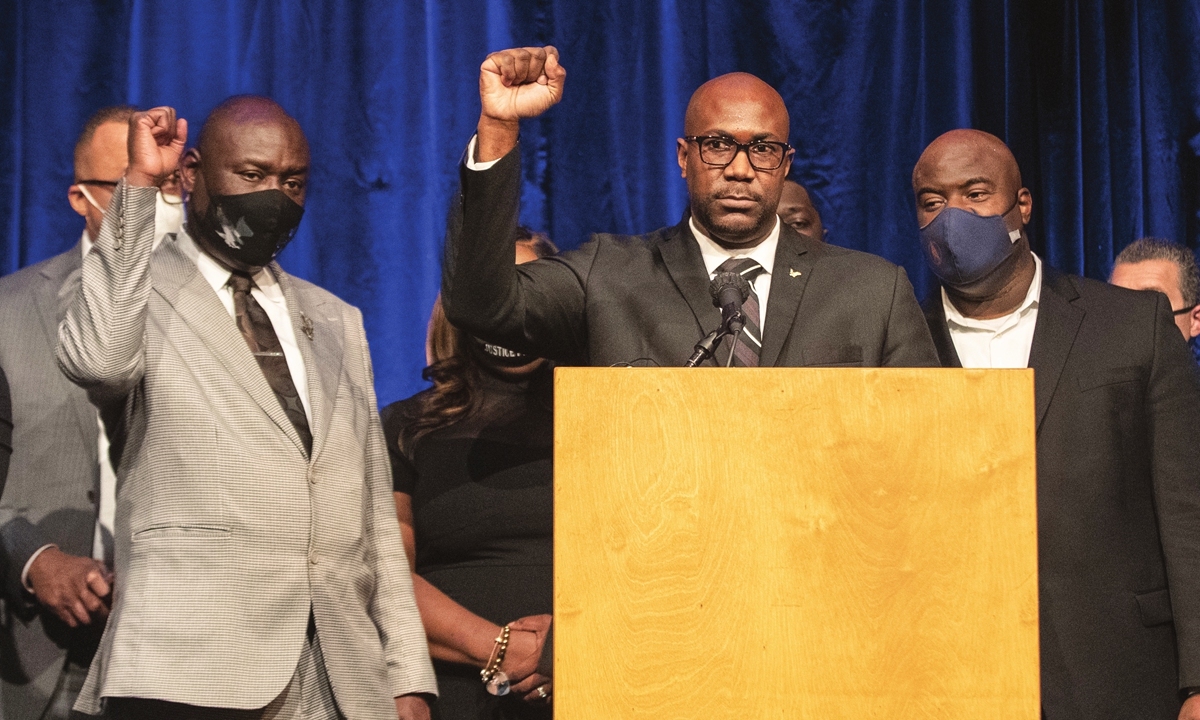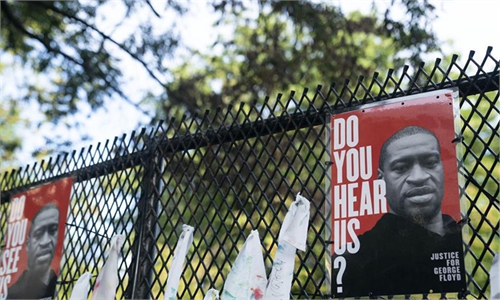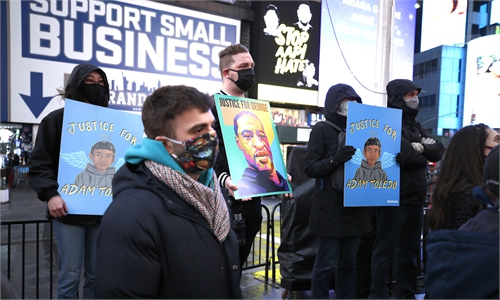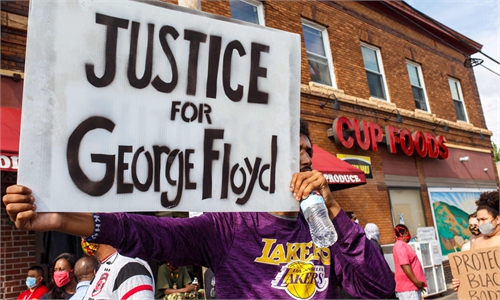
Philonese Floyd, brother of George Floyd, speaks to the press in Minneapolis, the US. Photo: VCG
The jury's guilty verdict on a former police officer responsible for killing George Floyd induced cheers and tears among many Americans, and was hailed by some US politicians, including President Joe Biden, who called it "a step forward" while Western media called it "watershed moment."
Does the verdict of this case really herald a change in the US deep-seated racial crisis? Chinese analysts said the guilty verdict, although eased anger and anxiety from the George Floyd case for months, failed to touch the very root of US racial problems.
Trumpeting the significance of the case to make political gains also shows the US politicians' inability to tackle the problem, said observers, noting that despite a glimmer of positivity the verdict represents, it changes with the US' racial conundrum.
Former Minneapolis police officer Derek Chauvin was found guilty on all counts Tuesday for causing Floyd's death. He was convicted of second- and third-degree murder, as well as second-degree manslaughter, which could send him to prison for the rest of his life, US media reported.
A bystander's video of that incident last May shows that Floyd, a 46-year-old black man, begged for his life while Chauvin pressed his knee on his neck for more than nine minutes during an arrest. Floyd repeatedly told police officers that he could not breathe before ultimately taking his last breath on the pavement.
Chauvin's conduct sparked a nationwide firestorm of protests and unrest against police brutality and racism, which later rippled across the world.
After the verdict was announced on Tuesday, there were tears and cheers on the streets of Minneapolis. Biden and Vice President Kamala Harris praised the verdict as a step forward in the fight against systemic racism.
"This can hardly be called significant at all," Lü Xiang, a research fellow on US studies at the Chinese Academy of Social Sciences in Beijing, told the Global Times. The expert said that some US politicians are just taking advantage of the case to gain plaudits, but they failed to propose concrete plans to tackle the root of the problem, including a wealth gap and gun control, which shows their inability to solve the problem.
A day after Chauvin's verdict, the US Justice Department launched a federal investigation on Wednesday into policing practices in the city of Minneapolis. The probe would look whether the police department engages in a pattern of excessive force, among other issues.
During a news conference following Chauvin's conviction, US House of Representatives Speaker Nancy Pelosi called the outcome "a step in the right direction for justice" and thanked Floyd for sacrificing his life for justice.
Pelosi's statement drew wide criticism as many called it "totally inappropriate." "I don't expect anything less of Nancy Pelosi," tweeted Frederick Joseph, author of "The Black Friend: On Being a Better White Person."
"Racism is and has always been a spectrum," he added.
The case has such far-reaching influence because the nine-minute video was heart-gripping for most to watch, but other violence against black people in the US went unnoticed, said Lü.
On the same day when the Chauvin verdict was out, police in Columbus, Ohio on Tuesday fatally shot a black teenage girl they confronted as she lunged at two people with a knife. Days before the verdict, an officer who fatally shot a black man during a traffic stop near Minneapolis mistakenly confused her gun for her Taser, authorities said.
"Putting off the little spark from the Floyd case won't erase the deep-rooted conflict. Unlike China, which can allocate most resources to solve problems under a coordinated arrangement, the US way of problem solving relies on a joust between different groups. But the process will be very slow and painful for the US," said Zhang Tengjun, assistant research fellow at the China Institute of International Studies.
As anger incited by the Black Lives Matter movement has yet to subside, the rise in hate crimes against Asians further widens the country's deepening racial gap.
The US Senate voted last Wednesday to advance a bill directing the Justice Department to speed up its review of anti-Asian hate crimes during the COVID-19 crisis. Six Republicans voted against the legislation, including Ted Cruz and Tom Cotton, who are the most vocal critics of China's so-called human rights record.
Cruz said he opposes the bill as it is "a Democratic messaging vehicle designed to push the demonstrably false idea that it is somehow racist to acknowledge that COVID-19 originated in Wuhan, China and that the Communist Party of China actively lied and suppressed information about the outbreak, allowing it to become a global pandemic."
Asian hate was largely fanned up by former US president Donald Trump and other politicians, who railed against the "China virus" and took a hostile stance against China on every front, and blamed other countries, especially China for all US failures, said Zhang.
Analysts said after Biden took office, he repeated Trump's old tactics, only in a softer manner. "The Democratic and Republican parties may vie for each other in this blame-others game in order to gain more support," said Lü.
"Politicians' beautiful words have little use in subduing rising racial conflict in the US. Yet their inability to solve the racial problem and continuing to blame others will only drag the US into a more divided society," according to Zhang.



